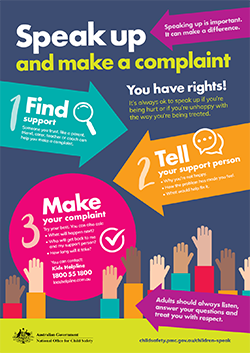Speak up and make a complaint

The Royal Commission into Institutional Responses to Child Sexual Abuse found that appropriate complaint handling and response is an essential standard of a child safe institution. The Royal Commission’s research affirmed the importance of institutions taking a child‑focused approach to complaint handling. A child‑focused approach helps children and young people to feel comfortable and empowered to make a complaint or raise a concern.
Principle 2 of the National Principles for Child Safe Organisations states that children and young people should be:
- informed about their rights
- participate in decisions affecting them, and
- be taken seriously.
This applies across all areas where organisations engage with children and young people, including when children and young people raise complaints and concerns. Children and young people are more likely to speak up about concerns if they know their views are valued and welcomed.
Raising complaints in an organisation is difficult – the process can be complex and emotionally draining. This is particularly true for children and young people. Children and young people may be unaware they have the right to speak up when they feel uncomfortable or unsafe, and can find the complaint process scary and confusing.
The National Office engaged the Commissioner for Children and Young People Western Australia to develop resources to help children and young people understand their right to speak up when they feel unsafe, unhappy or unfairly treated. The new Speak up and make a complaint resources are now available. The resources also include information to help adults talk about the resources with children and young people in their lives, and high-level guidance for organisations.
The resources include a poster and leaflet for children and young people, breaking the complaint process down into three steps. They also provide simple guidance on what to expect and how to find more information. The poster and leaflet are also available in 10 additional languages. Resources to help adults understand how to help children and young people use the poster and brochure, and how they might respond when a child or young person raises a concern with them, are also available. This includes a written guide and two scenario videos that provide examples of how to respond when a child raises a concern. Additionally, high level guidance is available to support organisations to understand their important role.
